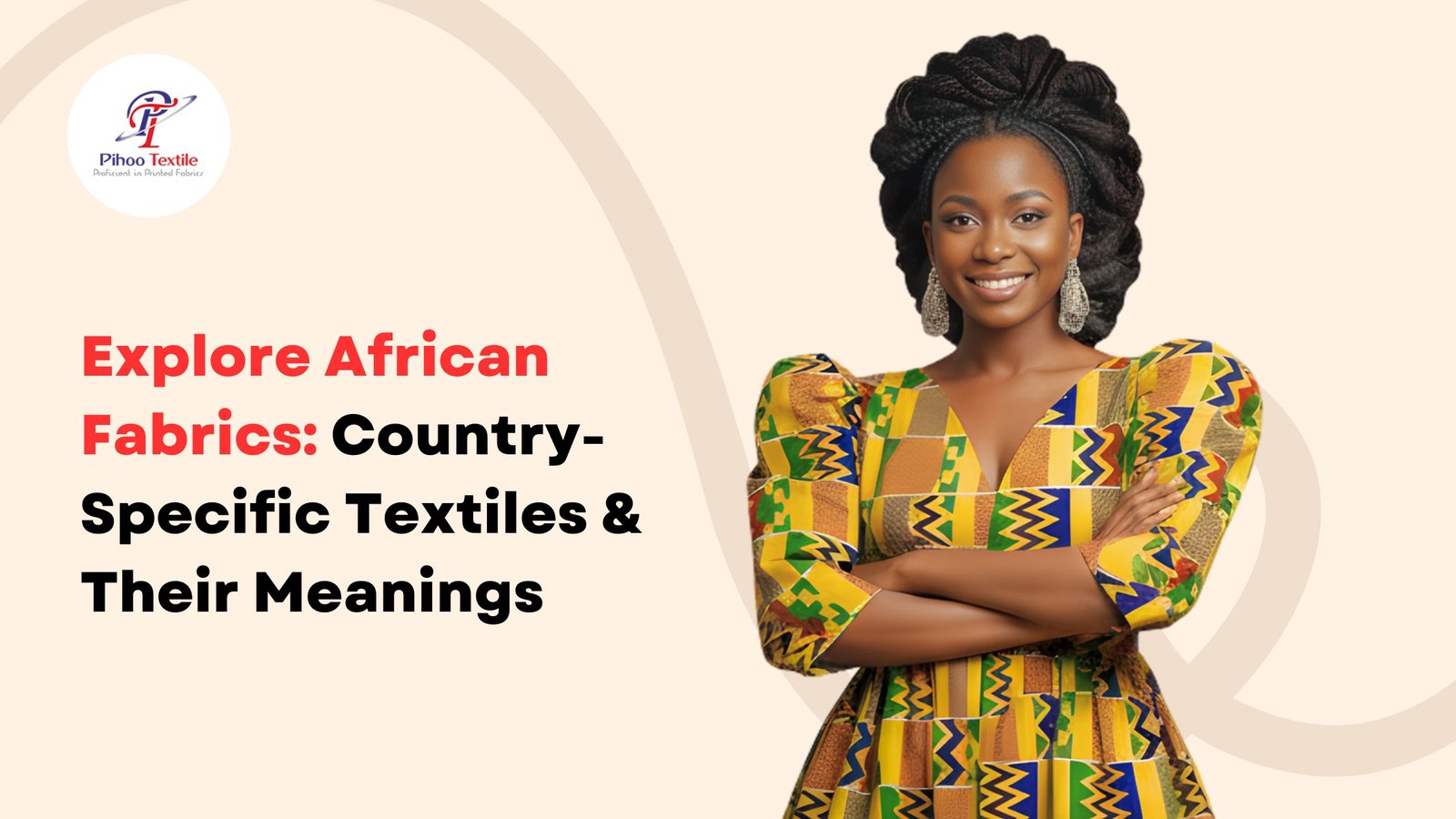Explore African Fabrics: Country-Specific Textiles & Their Meanings
African textiles are a kaleidoscope of colors, symbols, and stories, capturing the soul of entire communities and nations. From royal garments in Ghana to handwoven treasures in Mali, each region’s signature fabric is a vibrant testimony to tradition, artistry, and cultural identity. Join Pihoo Textiles in unraveling the unique world of African fabrics—where every thread tells a story.
The Power of African Textiles in Culture & Identity
African fabrics go beyond decoration: they’re historical records, spiritual tools, and identity badges worn with pride. Whether it’s the symbolic motifs of Kente, the earthy textures of Bogolan, or the regal shimmer of Bazin, these textiles embody the stories and values of the people who create and wear them.
West Africa: Ghana’s Kente & Nigeria’s Adire
Kente Cloth – Ghana
- Origins: Traditionally woven by the Ashanti and Ewe peoples of Ghana and Togo.
- Features: Intricate, checkerboard designs in vibrant silk and cotton. Early Kente was reserved for royalty and special occasions—a single cloth could contain hundreds of visual symbols sharing messages of philosophy, history, or social status.
- Meaning: Each color and pattern denotes concepts like peace, wealth, or unity. For instance, gold represents royalty and spiritual purity, while black stands for maturity and ancestral connection.
Adire – Nigeria
- Technique: A Yoruba tie-and-dye process producing elaborate indigo fabrics.
- History: Originally, Adire fabric was handwoven cotton dyed with indigo by Yoruba women. The patterns range from geometric to symbolic, often telling stories or representing family status.
- Modern Use: Revived by prominent Nigerian designers, Adire is now celebrated fashion in both Nigeria and worldwide, symbolizing resilience and creative spirit.
Mali: Mud Cloth (“Bogolan”)
- Made in Mali: Bogolan or Mud Cloth is a hand-woven cotton textile, dyed using fermented mud and plant matter.
- Visuals: Recognized by its earthy tones and geometric patterns, each motif and design element conveys social status, major life events, or identities within the community.
- Symbolism: In Mali, wearing Bogolan is more than style; it is a spiritual connection to the earth and ancestors. Modern fashion houses have adopted Bogolan, blending tradition with bold, contemporary looks.
Central Africa: Cameroon & The Congo
Bark Cloth – Cameroon & Uganda
- Material: Extracted from fig tree bark, softened and beaten to form a unique, strong fabric.
- Use: Historically, bark cloth was ceremonial wear for kings in Cameroon and the Baganda people in Uganda. Today, it retains ritual importance and is still used in traditional celebrations.
- Embellishment: In West Cameroon, kings wear bark cloth adorned with beadwork and elaborate weaving.
Kuba Raffia – Democratic Republic of Congo
- Context: Woven from raffia palm leaves, Kuba cloths exhibit cut-pile, embroidery, and appliqué—often used for ceremonial skirts and wraps.
- Meaning: Each Kuba piece may mark marriages, funerals, or rites of passage, with the patterns relating to proverbs or clan history.
East & Southern Africa: Uganda, Kenya, Ethiopia, Angola
Kanga & Kitenge – East Africa
- Popular in Tanzania and Kenya: Both are cotton fabrics, printed with vibrant motifs and Swahili proverbs. Kangas are often gifted for special occasions, functioning as both fashion and communication.
- Cultural Significance: Reflect everyday life, social values, and communal wisdom.
Bark Cloth – Uganda
- Noted in Uganda: This fabric maintains ceremonial value as both a spiritual and practical textile, still used by the Baganda people during key rituals.
Samakaka – Angola
- Design: Recognized for its bold geometric patterns, the Samakaka fabric is a national symbol in Angola, used in fashion, art, and even as home textiles.
- Symbolism: The colors and motifs are rooted in local traditions, making Samakaka a vibrant expression of Angolan identity.
West Africa: Mali’s Bazin Riche
- Bazin (Bazin Riche): A hand-dyed damask fabric, stiff and shimmering, highly prized in Mali, Burkina Faso, and Senegal.
- Cultural Use: Favored for grand boubous and ceremonies, Bazin’s shimmering finish denotes elegance and status, with each piece colored and embroidered by hand for uniqueness.
Table: Signature African Fabrics by Country
| Country/Region | Signature Fabric | Key Features & Meanings |
| Ghana (West Africa) | Kente | Intricate silk/cotton strips, status, proverbs, worn for celebrations |
| Nigeria (West Africa) | Adire | Indigo tie-dye, geometric symbolism, identity, creativity |
| Mali (West Africa) | Bogolan (Mud Cloth) | Handwoven, mud dyed, spiritual & social symbolism in patterns |
| Cameroon (Central) | Bark Cloth, Toghu | Bark-based fabric for royalty; Toghu is embroidered velvet for ceremonies |
| Congo (Central Africa) | Kuba Raffia | Palm raffia, intricate embroidery, ceremonies, lifecycles |
| Kenya/Tanzania (East) | Kanga, Kitenge | Printed cotton with motifs/proverbs, worn daily, social messaging |
| Angola (Southern) | Samakaka | Bright geometric patterns, national pride, used in fashion/art |
| Mali (West Africa) | Bazin Riche | Luxury damask, hand-dyed, worn at weddings and special occasions |
African Fabrics in Modern Global Fashion
African textiles have leapt from local boutiques to high fashion couture. International designers now collaborate with African artisans, infusing classic patterns with modern silhouettes. Celebrities worldwide are choosing these textiles for their symbolism and style. As a result, Pihoo Textiles is proud to bring authentic, customizable African cotton prints to a global audience, ensuring the legacy of these crafts not only endures but thrives.
Pihoo Textiles: Preserving Heritage, Creating the Future
At Pihoo Textiles, we recognize the vital role of regional textiles in Africa’s cultural heritage. Our curated collections of Kente, Bogolan, Bazin, Kitenge, Adire, and many more bring the craftsmanship and stories of African fabric to the world, exporting not just cloth but identity, pride, and artistry. Whether you’re seeking fabrics for fashion, celebration, or home, explore Africa’s textile diversity with Pihoo Textiles—where tradition inspires every thread.
Explore our collections, embrace the stories, and wear Africa’s proud heritage, one fabric at a time.



